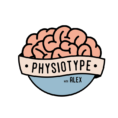Prone and Supine
What does it mean to be prone?
This is analogous to the “Thinking” functions in MBTI and Socionics: Te and Ti. People who are prone types or subtypes are more likely to display dominance in social interactions. This is because prone people are more disagreeable, willing to contradict others, and maintain their own goals separate from that of the collective group..
You can tell if someone is a prone individual by looking at their eyes and eyebrows (see image). If the apex (highest point) of a persons eyes/eyebrows are toward the outer edges of their face, they’re prone.
Personality types that are naturally prone are: Gama Class types (ENTP and INTP), Alpha Object types (ESTP and ISTP), Delta Class types (ENTJ and INTJ), and Beta Object types (ESTJ and ISTJ).


What does it mean to be supine?
This maps well with the “Feeling” types in MBTI and other Jungian personality theories. The cognitive functions that are attributed to supine behavior are Fe and Fi. People who are Supine types and subtypes are more likely to concede in arguments and over all be more submissive in social hierarchies. This is because Supine people are more likely to maintain group oriented goals above their own personal goals.
With Supine people, their eyebrows and eye shape tend to be the opposite that of prone people. Typically, the apex of their eyes and eyebrows will be more centralized or situated towards the middle of their face (see image).
Personality types that are naturally supine are: Beta Class types (ENFP and INFP), Delta Object types (ESFP and ISFP), Alpha Class types (ENFJ and INFJ), and Gama Object types (ESFJ and ISFJ).
Find Out Your Personality Type
Having trouble figuring out your Physiotype? Want to see if your Physiotype matches your MBTI or Socionics type?
